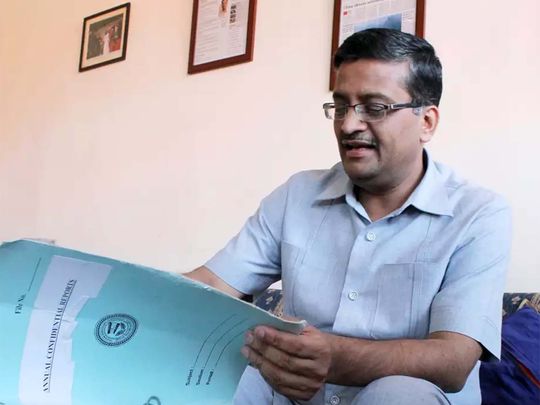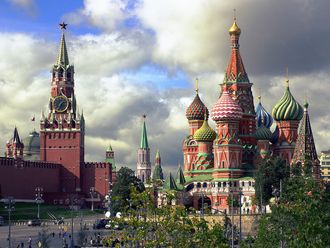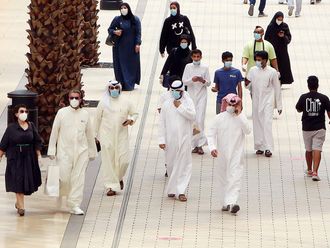
New Delhi: Fifty-three transfers in 28 years of service is quite a record that Ashok Khemka has been forced to set. The Indian Administrative Service (IAS) officer, known for his honesty and rigid stand against corruption, was transferred yet again recently — from Principal Secretary, Haryana’s Science & Technology Department to Principal Secretary, Archaeology & Museums Department.
Being put in non-functional posts and not assigned any work to being intimidated and receiving death threats, Khemka has gone through all. But he has refused to yield to any pressure tactics by politicians. The 1991-batch officer has held myriad positions in Haryana’s different departments including housing, land administration, finance and rural development.
Khemka first hit the headlines in 2012 when he cancelled the mutation of a Gurugram, Haryana land deal that happened between real estate developer DLF and Sky Light, the company linked to Congress leader Sonia Gandhi’s son-in-law Robert Vadra.
Commenting on the case in particular, and the situation in general, Khemka said, “It’s a quintessential case of crony capitalism. The unscrupulous among the corporates co-opt the political and bureaucratic classes to derive private advantage at public cost. This form of corruption is a tough nut to crack because successive regimes also get co-opted with the same money power.”
In an exclusive interview with Gulf News, the fearless officer speaks his mind:
Gulf News: After your recent transfer, you said, ‘the prize of honesty’ is humiliation.’ What was the reason for this transfer?
Khemka: Reasons are not indicated in the transfer orders; it is treated as an executive prerogative. The transfer was from one insignificant and inconsequential post to another. These violate the procedure laid down in the statutory service rules and also the general directions of the Supreme Court of India. Postings should not depend on the whims and fancies of an individual, but on the officer’s aptitude. A very thin line divides public interest from private interest and unless the ruler is good intentioned and competent, the line is invariably transgressed.
When were you transferred the first time for exposing corruption?
The first substantive transfer was in 1994 after I developed serious differences with my boss whether or not the Licensing and Registration Branch under my charge should be forcing applicants to donate to the District Red Cross Society. The money being collected was used for activities by the administration not ordinarily permitted out of the State budget.
And what about subsequent postings?
I have tried hard to address the scourge of corruption in all my postings. One of the reasons for my frequent transfers is that there is no one to lobby for me, so it becomes relatively easy to transfer me on a slight pretext. Also, there is no effective remedy against a transfer order in the courts. And if you depend on a monthly salary for your subsistence, you have no choice but to join the new post.
The transfers may be ‘demoralising’ for you, but in the eyes of the masses your stature is very high because of your morality. Is that what keeps you going?
It certainly hurts when the transfer is used for punishing for performing public duty or not obeying the master’s diktat. Colleagues give you a feeling of being a misfit in the system because holding coveted posts for long durations is considered as a sign of success. At the early stage of my career, I realised the competition was who would hold the post of district magistrate in prime districts and for how long. The departments are clearly categorised as excellent, good, average and sideline. And when you are seen as incorrigible, you are sidelined, which is dehumanising. I was repeatedly told to quit and look for other alternatives in the private sector.
Under which governments your transfers happened as ‘punishment’?
My postings have largely been government neutral. However, the 2012 posting was a watershed moment in my service career. After this, the quality of the jobs assigned to me has declined considerably. The system is impervious to the injustice and destruction of my legitimate career aspirations.
When Prime Minister Narendra Modi came to power in 2014, he assured the bureaucracy of protection against malicious prosecution for bona fide decisions, saying secretaries to the government can approach him or email him directly with inputs to improve governance.
The PM may have meant the bureaucrats in the Government of India. But, I feel, an honest person does not need protection. In fact, the extra cover given to government servants in the amended Prevention of Corruption Act has not improved governance. On the contrary, the amendment has made the political masters even more powerful because the anti-corruption agency needs to take prior permission from the political master on who and what to investigate.
Have you ever directly apprised Modi of the often run-ins you have with people in power?
Recently, I have written to the state’s chief minister (Manohar Lal Khattar) to accord me permission to write to the PM in this matter.
What should the bureaucratic template be in the new India?
There is no magic formula. But, the present technology-driven world requires more specialist cadres. The system must develop in-house competency. Today consultants, who are not subject experts but marketers of products and services of vendors, drive governance.
At a glance:
•Ashok Khemka was born in Kolkata in 1965.
•Early education from St Xaviers School in Kolkata followed by Matriculation — 1982.
•Bachelor of Technology (Computer Science and Engineering) from the Indian Institute of Technology, Kharagpur, West Bengal — 1988.
•Became the first non-resident scholar to do PhD from the Tata Institute of Fundamental Research, Mumbai — 1995.
•He has received awards for his commendable work and crusade against corruption.











